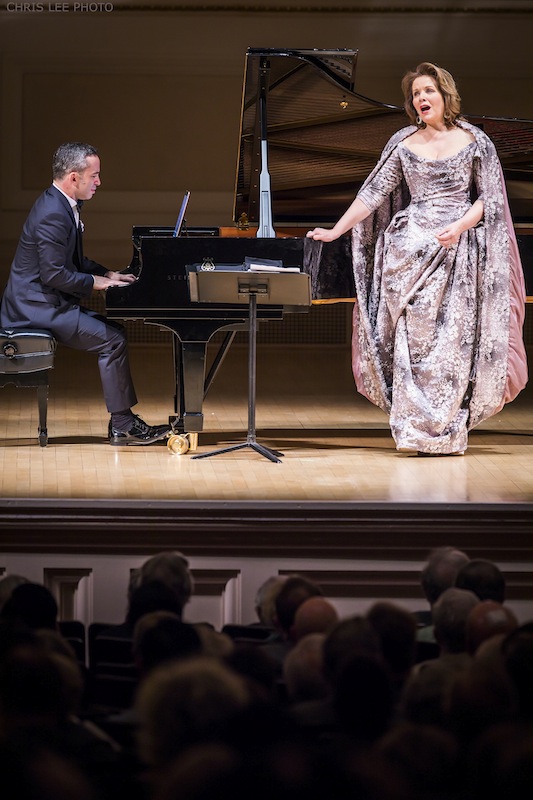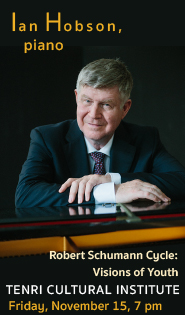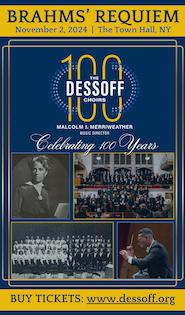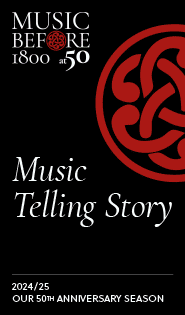Moving into new stage, Fleming displays familiar artistry at Carnegie Hall
Last spring, Renée Fleming announced that she would be leaving the opera stage after her performances at the Metropolitan Opera in one of her finest roles, the Marschallin in Der Rosenkavalier. The point was not to give up performing but to turn her energies towards more concertizing, assisting arts organizations behind the scene, and musicals—she will appear in a revival of Rodgers and Hammerstein’s Carousel next spring.
The bottom line was that she could still sing and still wanted to sing, just in different contexts. A healthy crowd of her adoring fans, and truly everyone in the audience, had the pleasure of hearing how glorious this new stage of her career can be Monday night at Carnegie Hall.
Fleming, accompanied by the witty, urbane, and energetic pianist Inon Barnatan, sang a collection of old and new music, including New York and world premieres, and delivered the epitome of what a vocal recital can be. There was superior music making and also a direct, unmannered, and close communication between artist and audience that grew more engrossing as the evening went on. The evening culminated in some time-stopping, beautifully expressive singing that could ease a troubled soul.
There was no particular theme or direction, no argument other than the rewards of music for its own sake. Fleming sang a large handful of assorted songs from Brahms; selections from André Previn’s new Ten By Yeats and an aria from his A Streetcar Named Desire; premiered two songs commissioned by Carnegie from Caroline Shaw; brought out some curiosities by Egon Kornauth; and finished with two arias from one of her favorite composers, Richard Strauss. And then there were the encores.
The Brahms songs were companionable in that Brahmsian way; sincere and rooted in the earth,—one is drawn to sympathize with the feelings in the music while the composer keeps himself at a distance. Fleming sounded warm and bright, but a little thin, in the late “Ständchen” and the Op. 46 song “Die Mainacht.” It seemed like she was feeling out the space, where her voice fit into it, and what the crowd was like.
With “Mondnacht” she began to open up, the hues in her voice grew richer, the silver began to gleam. The final songs were relaxed and flowing with a balance of sophistication and naturalness that is probably Fleming’s calling card. She was unruffled by a ringing telephone during, of course, “Wiegenlied.”
Previn wrote his new Yeats cycle, heard for the first time in New York, expressly for Fleming, just as he created the role of Blanche DuBois in Streetcar for her. The songs are yet another facet in Previn’s underrated musical career—they were fascinating, full of surprises, and need to be heard again. The composer sat in a box, apparently enjoying every moment.
Fleming sang six of the ten, which included notable poems like “A Song” and “When You Are Old.” They consistently set a high vocal line with a subtle quality of naïveté against a complex accompaniment that was full of feints, misdirections, twists and turns. Barnatan’s playing was an excellent fit for Fleming’s voice. He used a minimum of pedal and his touch and dynamics were responsive and supportive while giving maximum space to her voice.
With the aria “I can smell the sea air,” in which Blanche imagines herself dying and being buried at sea—all very romantically—Fleming moved up to another level. Though she never got “in character,” all the arias she sang brought out greater dimensions of expression. Her voice opened up, and so did her musicality, which pushed at the limits of the notes and phrases.
There was the minor, but in no way disappointing, interruption of more songs. Shaw’s new ones set poetry by Mary Joe Salter—composer and poet were on hand to acknowledge applause. “Aurora Borealis” and “Bed of Letters” were well-made, with the music formed around the poetry and sitting in a strong register for Fleming’s voice. Each accumulated emotional power and sonic beauty, and each was satisfied with the sense of neatness and safety that is so strange to hear in these unsettled times.
Kornauth, born in 1891 and dead in 1959, was a resolute composer of 19th-century romantic music. He’s a total obscurity, and the four songs Fleming sang demonstrated why—despite being a student of Franz Schreker, Kornauth wrote like a student of Brahms. A dutiful, uninspired student. That made for four songs exalting nature, that were pleasant only in that one got to hear Fleming sing them.
Perhaps she intended to set up the audience. She finished the regular part of the program with two selections from Ariadne auf Naxos, “Ach! Wo war rich? Tot?-Ein Schönes war” and “Es gibt ein Reich,” and they were glorious. By this point in the concert, her voice was almost spectacularly beautiful–gleaming, pure, substantial, amazingly graceful. She sounded lighter than one is used to hearing in operas, and also closer to the meaning in the music. Her authenticity was more dramatic and more moving than any stage artifice could provide. This was breathtaking music making, with Barnatan joining in the ovation that followed.
The encores just piled on more decadent pleasures. Strauss’ “Cäcilie” was effortless; coming out the second time, she sang a wonderful Meredith Willson’s “Till There Was You,” dedicated to her friend Barbara Cook. Last came the “Song to the Moon”—her signature aria–from Dvořák’s Rusalka in a mesmerizing performance that reached deep into the soul. Every opera stage in the world will miss her, but her fans and everyone else will fortunately still have Renée Fleming and her singularly vulnerable artistry around for years to come.
Baritone Andrei Bondarenko sings Tchaikovsky, Fauré, and others 7:30 p.m. December 8 at Carnegie Hall.carnegiehall.org



